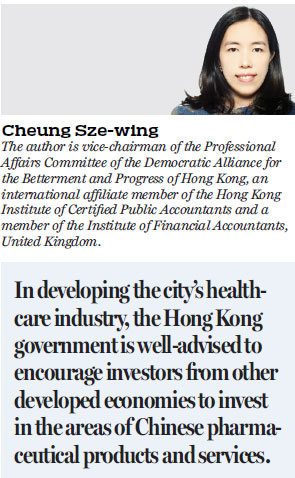HK should become a world-class pioneer of Chinese medicine

Against a backdrop of growing health problems brought by a rapidly aging population both in Hong Kong and worldwide, which are aggravated by drastic changes in the environment and numerous human genetic mutations, the continuous development of medical technology and innovation plays a crucial role in sustaining health and saving lives.
Hong Kong's healthcare system and its management are second to none when compared with other developed economies. The Department of Health attaches great importance to fostering partnerships with outstanding healthcare professionals and bodies, both in the city and abroad, in its effort to improve the health of people in Hong Kong. This is also to keep Chief Executive Carrie Lam Cheng Yuet-ngor's "We Connect" manifesto promise to enhance the role of Chinese medicine in the public healthcare system so as to provide top-quality healthcare services to the public.

The Hospital Authority reported that it used up the HK$49-billion grant from the government for the 2014-15 fiscal year to enhance medical services in public hospitals. In the following fiscal year, demand for medical services continued to rise with the number of inpatient discharges and deaths hitting 1.67 million, a rise of about 4 percent from 2014-15. The number of specialist and general outpatient attendances reached 7.31 million and 5.98 million, respectively. Supported by a relatively small budget, equivalent to just 2.5 percent of Hong Kong's GDP, the authority serves nearly 90 percent of all inpatient healthcare needs in the city. These contrasting figures reflect the prevalence of chronic diseases on one hand and suggest a shortage of medical staff on the other. It is generally agreed that the Food and Health Bureau should implement a long-term policy on building up professional healthcare manpower, which should include measures to boost the professional development of Chinese medicine practitioners and ensure all locally trained Chinese medicine graduates can be employed in Hong Kong's public healthcare system.
Since the government is initiating reforms in the healthcare and medical system, it is a good time to consider repositioning Chinese medicine so it can help the medical system cope with rising capacity pressure amid manpower constraints. It is suggested the Hospital Authority and Food and Health Bureau raise the bar for Chinese medicine industry development in Hong Kong; they should seek ways to strengthen cooperation with Chinese mainland hospitals and other medical institutes in areas such as research and development of pharmaceuticals, prescriptions, medical equipment and latest medical technologies as well as providing specialist training for Chinese medicine practitioners; they should also facilitate the exchange of expertise in healthcare management and policy development for medical services in public hospitals. By enhancing cooperation between the sides, Hong Kong can expand the coverage of its healthcare services and strengthen its capacity and capabilities. Ultimately, Chinese medicine will contribute greatly to the continuous improvement and sustainable development of Hong Kong's healthcare system.
Aiming to provide world-class medical services to Hong Kong residents, Hong Kong Science and Technology Parks Corporation and Hong Kong Chinese Medical Science Academy are vigorously engaged in medical and pharmaceutical R&D, especially in colorectal cancer treatment. It is suggested that any R&D achievements on Chinese pharmaceuticals and medical technology should be promoted and exported worldwide so as to facilitate technology transfer and help nurture talents. It is suggested R&D results on minimally invasive surgery will also be promoted across the Asia-Pacific region, particularly to mainland surgeons. More frequent exchange on management experience and technology will help improve the standard and quality of Hong Kong's medical management and develop the city into an Asian pharmaceutical R&D center.
In developing the city's healthcare industry, the Hong Kong government is well-advised to encourage investors from other developed economies to invest in the areas of Chinese pharmaceutical products and services. The government may also consider providing financial support to small and medium enterprises in the pharmaceutical industry as incentive to encourage the development of Chinese medicine products and services. It may also encourage startup companies to invest in the area of medical technology R&D to accelerate the development of Chinese medicine in Hong Kong. Further development of Chinese pharmaceutical products and services will provide new impetus to Hong Kong's innovative healthcare system and create new sources of revenue for the special administrative region government's treasury.
(HK Edition 12/01/2017 page12)
Today's Top News
- Spanish king on first state visit to China
- Japan must stop playing with fire on the Taiwan question: China Daily editorial
- The one who tied knot must untie it: China Daily editorial
- Xi congratulates Ouattara on re-election as president of Cote d'Ivoire
- Supercarrier to be put through paces
- Game changers for China's sports industry






























